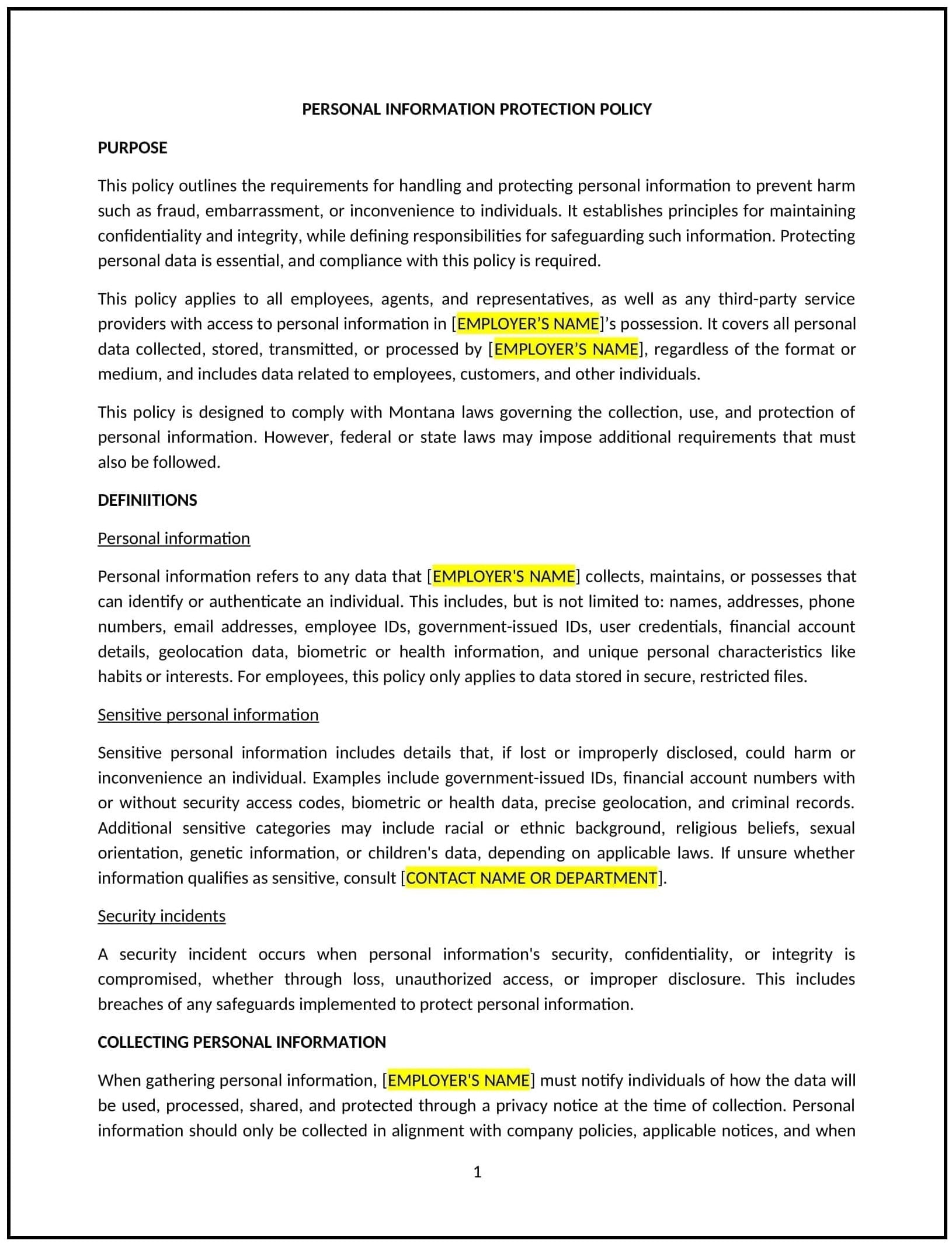Personal information protection policy (Montana): Free template
Got contracts to review? While you're here for policies, let Cobrief make contract review effortless—start your free review now.

Customize this template for free
Personal information protection policy (Montana)
A personal information protection policy helps Montana businesses safeguard the personal information of employees, customers, and other stakeholders. This policy outlines how businesses collect, store, process, and dispose of personal data, ensuring that privacy is respected and legal requirements are met.
By implementing this policy, businesses can protect sensitive information, reduce the risk of data breaches, and build trust with employees and customers by demonstrating a commitment to data security and privacy.
How to use this personal information protection policy (Montana)
- Define personal information: The policy should define what constitutes personal information, such as names, addresses, social security numbers, financial information, and any other data that can identify an individual.
- Specify data collection practices: The policy should outline how personal information is collected, including when and how consent is obtained, what data is collected, and for what purposes.
- Set data storage and security standards: The policy should include guidelines for how personal information should be stored, whether electronically or physically, and the security measures that should be in place to protect this information (e.g., encryption, access controls, secure storage).
- Outline data access controls: The policy should specify who within the business has access to personal information and under what circumstances. It should also address how data access is granted, monitored, and revoked to ensure that only authorized personnel can view or process sensitive data.
- Establish data retention and disposal practices: The policy should provide guidelines for how long personal information is retained and how it should be disposed of securely when it is no longer needed (e.g., shredding physical documents, securely deleting electronic records).
- Address third-party data sharing: The policy should outline when and how personal information may be shared with third parties, including vendors or service providers, and specify the safeguards in place to ensure that third parties protect the data adequately.
- Review and update regularly: The policy should be reviewed periodically to ensure it remains up-to-date with evolving privacy regulations, industry standards, and the company’s data protection practices.
Benefits of using this personal information protection policy (Montana)
This policy provides several key benefits for Montana businesses:
- Protects sensitive information: By implementing strong data protection measures, businesses can reduce the risk of data breaches and ensure the confidentiality of personal information.
- Builds trust with employees and customers: A clear policy demonstrates the company’s commitment to protecting privacy, which can enhance trust and loyalty among employees, customers, and other stakeholders.
- Reduces legal and financial risks: A well-structured personal information protection policy helps businesses comply with privacy laws and regulations, reducing the risk of legal penalties and reputational damage from data breaches.
- Improves data security: The policy helps businesses implement best practices for securing personal data, including encryption, access controls, and secure storage, minimizing vulnerabilities and exposure.
- Enhances operational efficiency: Clear guidelines for data collection, storage, and disposal help streamline operations, ensure consistency, and reduce the potential for human error when handling personal information.
- Supports business continuity: By safeguarding personal information, businesses can protect their assets, reduce operational disruptions, and maintain continuity in case of a data breach or other security incident.
Tips for using this personal information protection policy (Montana)
- Communicate the policy clearly: Ensure that all employees understand the importance of personal information protection, the data protection measures in place, and their responsibilities for handling sensitive information.
- Train employees on data protection: Provide regular training to employees about personal information protection, including how to handle data securely, recognize phishing attempts, and report security incidents.
- Use strong security measures: Implement robust security measures such as encryption, multi-factor authentication, and secure passwords to protect personal data from unauthorized access or breaches.
- Regularly audit data protection practices: Conduct periodic audits of the business’s data protection practices to identify any vulnerabilities, ensure compliance with the policy, and take corrective action where necessary.
- Monitor third-party vendors: When sharing personal information with third-party vendors or service providers, ensure they have adequate data protection policies in place and that contracts include provisions for safeguarding personal data.
- Stay updated on privacy laws: Regularly review and update the policy to stay compliant with evolving privacy laws and industry standards, including Montana state laws and federal regulations like GDPR or CCPA if applicable.